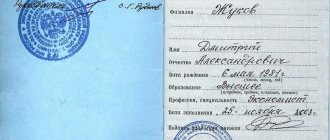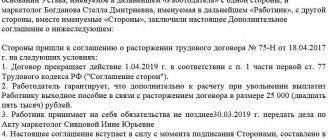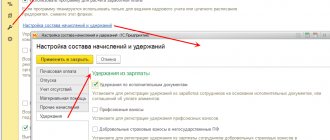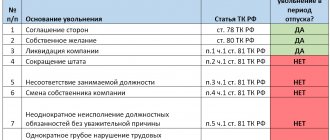Expert consultation
Dismissal at the initiative of the employee is the most common and safest way to part with an employee. Most employers choose this option. But even on this basis for dismissal, controversial situations are possible. Read more about this in the article by our expert Anastasia Chekmareva.
Even if the work record book says “dismissal at his own request,” the employee may claim that he was forced to write a statement. Or the employer may make a mistake in completing the documents. How can this threaten the employer? Labor disputes with the employee and fines for violation of labor laws are possible. To prevent this from happening, let’s consider what to consider when dismissing an employee under clause 3, part 1, art. 77 Labor Code of the Russian Federation.
The basic rule that cannot be violated when dismissing on the initiative of an employee is that an employment contract can be terminated only if the employee submits an application voluntarily. This is confirmed by the explanations of the Supreme Court, for example: paragraph 14 of the Review of Judicial Practice of the Supreme Court of the Russian Federation No. 2 (2021).
The law does not contain special criteria by which compulsion to dismiss can be established. This may include pressure on the employee, threats, or even physical harm. In the event of a trial, the employee must prove that the employer forced him to write a letter of resignation of his own free will (Part 1 of Article 56 of the Code of Civil Procedure of the Russian Federation, paragraph 22 of the Resolution of the Plenum of the Supreme Court of the Russian Federation dated March 17, 2004 N 2).
How do employees prove that they were forced to quit? Let's look at examples from judicial practice.
The wording in the application can serve as evidence of coercion. Let us turn to the Determination of the Judicial Collegium for Civil Cases of the Supreme Court of the Russian Federation dated 04/05/2021 N 5-KGPR20-165-K2.
The employee had a conflict with the employer. In a nervous state, he immediately wrote a letter of resignation of his own free will: “I ask you to dismiss me of my own free will due to a violation of my labor rights by management.” The employee was fired, but later he came to his senses and went to court. He claimed that it was his employer who forced him to write a statement. He also demanded that he be reinstated at work, that the employer recover his average earnings for the period of forced absence, compensation for moral damages, and legal expenses.
The courts of first instance, appeal and cassation sided with the employer. The employee wrote the statement voluntarily and did not withdraw it. The reasons for which the statement was written do not affect the legality of the dismissal. But the Supreme Court did not agree with the lower courts, pointing out that the wording in the statement indicates coercion - the employer forced the employee to write a statement. The case has been sent back for retrial.
Another dangerous wording in a letter of dismissal at the initiative of an employee can be seen in the Determination of the Judicial Collegium for Civil Cases of the Supreme Court of the Russian Federation dated 02/01/2021 N 14-КГ20-14-К1.
The kindergarten employee formulated her resignation letter as follows: “I ask you to dismiss me from my position at my own request due to the psychological pressure exerted on me by the kindergarten administration, the creation of a conflict situation regarding my appeals to the labor dispute inspectorate, the cruel treatment of my son attending this educational institution.”
The Supreme Court recognized the employee’s argument that she did not want to quit her job as justified. From the contents of the resignation letter it follows that it was given involuntarily so that the management of the organization would stop putting psychological pressure on her.
If it does not follow from the wording that the employee wrote the statement under compulsion and at the same time he provided it to the employer and did not withdraw it before the date of dismissal, then the courts most often side with the employer. One example of a court decision in favor of the employer: Determination of the Eighth Court of Cassation of General Jurisdiction dated January 14, 2020 N 88-1748/2020
In practice, there are situations when, in order to avoid dismissal on compromising grounds (disciplinary action, unsatisfactory test results, etc.), employees write a statement of their own free will. According to the courts, this does not indicate coercion to dismiss. Let's consider the Ruling of the Seventh Court of Cassation of General Jurisdiction dated May 19, 2020 in case No. 88-8418/2020.
The employee was fired at her own request. But after the dismissal, she went to court demanding that the dismissal be declared illegal. The woman explained that she wrote the statement to avoid dismissal for an unsatisfactory test result. The courts supported the employer: filing a resignation letter of one’s own free will in order to avoid dismissal for another reason does not mean coercion.
Application for voluntary resignation
Labor legislation does not establish special requirements for the form and content of the application, but there are several nuances that will help the employer avoid risks. First of all, you should pay attention to the content of the application. Desirable wording: “I ask you to fire me of your own free will.” The text of the application can be written by hand or provided in printed form, but a mandatory requisite of the application is the personal signature of the employee.
The application must include the date of dismissal. If the employee does not put a date on the application, we recommend asking him to enter the date in person or rewrite the application. If the application does not indicate the date or it was entered by the employer independently, then there is a risk that the court will declare the dismissal illegal, for example: Appeal ruling of the St. Petersburg City Court dated March 15, 2018 No. 33-5761/2018 in case No. 2-6966/2017.
Agreement between the parties upon dismissal of an employee
Agreement of the parties (Article 78 of the Labor Code of the Russian Federation) is the basis for dismissal, which also has the fewest pitfalls. If both parties have agreed to terminate cooperation, this means that there is no mutual dissatisfaction between them that could become a reason to challenge the dismissal.
This basis comes into effect when the employee’s decision to leave his position must necessarily be supported by the employer’s consent. This situation may arise if the resigning employee, for example, is working under a fixed-term employment contract, the term of which has not yet expired.
The same reason may include the transfer of an employee to another employer by mutual consent.
Since the “leitmotif” of separation is the general decision of the parties, they also agree on all related issues, in particular, on the date of termination of cooperation.
Notice of dismissal
According to the general rule, an employee must notify the employer of voluntary dismissal at least two weeks in advance (Part 1 of Article 80 of the Labor Code of the Russian Federation).
The law establishes special deadlines for certain categories of workers:
- for workers during the testing period - no later than three days in advance (Part 4 of Article 71 of the Labor Code of the Russian Federation);
- for employees who have entered into an employment contract for a period of up to two months - three calendar days in advance (Part 1 of Article 292 of the Labor Code of the Russian Federation);
- for seasonal workers - three calendar days in advance (Part 1 of Article 296 of the Labor Code of the Russian Federation);
- for the head of an organization - at least one month (Article 280 of the Labor Code of the Russian Federation).
The specified period begins the next day after the employer receives the employee’s resignation letter. Please note: the date on the application and the date the employer received the application may not match. We recommend recording receipt of the application in a special journal to avoid controversial situations. The period is not interrupted by vacation or temporary disability. The date of dismissal may also fall within the specified periods (part 3 of article 14, part 1 of article 80 of the Labor Code of the Russian Federation, Letter of Rostrud dated 09/05/2006 N 1551-6).
If the employee does not want to work the specified period, or you want to say goodbye to him before the expiration of the notice of dismissal, then this is possible, but only by mutual agreement of the parties. This follows from part 2 of article 80 of the Labor Code of the Russian Federation.
There are situations when an employer is obliged to dismiss an employee on the day the application is received. Such situations include (part 3 of Article 80 of the Labor Code of the Russian Federation, paragraph “b”, paragraph 22 of the Resolution of the Plenum of the Supreme Court of the Russian Federation dated March 17, 2004 N 2):
- impossibility of continuing work (enrollment in an educational institution, retirement, or the presence of other valid reasons due to which the employee cannot continue to work, for example, sending a husband (wife) to work abroad, to a new place of duty);
- cases of established violation by the employer of labor legislation and other regulatory legal acts containing labor law norms.
Some employees should not be fired
Not everyone can be fired without a statement of their own free will. There are workers with immunity.
pregnant women - Art. 261 Labor Code of the Russian Federation. Even for absenteeism, rudeness and shortages at the cash register. The exception is when the company closes.
Mothers with children under three years old, and without a husband - up to fourteen years old, cannot be laid off or fired for low qualifications. A complete list of protected family workers is in Art. 261 Labor Code of the Russian Federation.
on sick leave or vacation is not fired. We have to wait to go to work. Vacation is considered not only four weeks a year, but also maternity leave, days without pay and going to session.
A minor is fired only with the consent of the labor inspectorate or commission for minors in his city - Art. 269 Labor Code of the Russian Federation. If officials are against it, the person continues to work.









